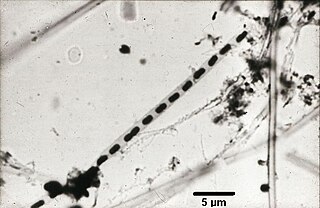
The Comamonadaceae are a family of the Betaproteobacteria. Like all Pseudomonadota, they are Gram-negative. They are aerobic and most of the species are motile via flagella. The cells are curved rod-shaped.

The Alteromonadales are an order of Pseudomonadota. Although they have been treated as a single family, the Alteromonadaceae, they were divided into eight by Ivanova et al. in 2004. The cells are straight or curved rods. They are motile by the use of a single flagellum. Most of the species are marine.
The Alteromonadaceae are a family of Pseudomonadota. They are now one of several families in the order Alteromonadales, including Alteromonas and its closest relatives. Species of this family are mostly rod-like shaped and motile by using one polar flagellum.
Acidicapsa is a bacterial genus from the family of Acidobacteriaceae.
Belliella is a Gram-negative, aerobic, chemoheterotrophic and non-motile bacterial genus from the family of Cyclobacteriaceae.
Rubidimonas is a genus from the family of Saprospiraceae with one known species.
Propionimicrobium lymphophilum is a Gram-positive bacterium which has been isolated from submaxillary tissue.
Chelativorans composti is a Gram-negative and thermophilic bacteria from the genus of Chelativorans which has been isolated from compost.
Gaiella occulta is a rod-shaped and non-motile bacterium from the genus Gaiella which has been isolated from deep mineral water in Portugal.

Nitriliruptor alkaliphilus is a non-spore-forming and non-motile bacterium from the genus Nitriliruptor which has been isolated from sediments from a soda lake in Siberia in Russia.
Caldanaerobius is a moderately thermophilic and anaerobic genus of bacteria from the family of Thermoanaerobacteraceae with one known species.
Alteribacillus is a genus of bacteria from the family Bacillaceae.
Paucisalibacillus is a genus of bacteria from the family of Bacillaceae.
Salipaludibacillus is a gram-positive genus of bacteria from the family of Bacillaceae.
Salirhabdus is a genus of bacteria from the family of Bacillaceae.
Flexivirga is a genus of bacteria from the family of Dermacoccaceae.
Chitinispirillum is a genus of bacteria from the family of Chitinispirillaceae with one known species. Chitinispirillum alkaliphilum has been isolated from hypersaline lake sediments from the Wadi el Natrun valley in Egypt.
Chitinivibrio is an extremely haloalkaliphilic genus of bacteria from the family of Chitinivibrionaceae with one known species. Chitinivibrio alkaliphilus has been isolated from hypersaline lake sediments from Wadi al Natrun in Egypt.
"Aliisedimentitalea" is a Gram-negative and aerobic genus of bacteria from the family of Rhodobacteraceae with one known species. "Aliisedimentitalea scapharcae" has been isolated from the shell of Scapharca broughtonii from the South Sea in Korea.
Phycisphaeraceae is a family of bacteria.


